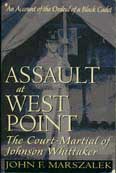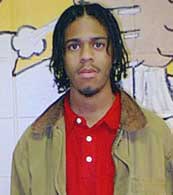Major Works
- Hold On with a Bulldog Grip: A Short Study of Ulysses S. Grant (2019) with David S. Nolen, Louie P. Gallo, and Frank J. Williams
- The Best Writings of Ulysses S. Grant (2015)
- Lincoln and the Military (2014)
- The Papers of Ulysses S. Grant, Vol 32: Supplementary Documents (2012)
- Lincoln Lessons: Reflections on America’s Greatest Leader (2009)
- A Black Congressman in the Age of Jim Crow: South Carolina’s George Washington Murray (New Perspectives on the History of the South) (2006)
- Sherman’s March To The Sea (Civil War Campaigns & Commanders) (2005)
- Commander of All Lincoln’s Armies: A Life of General Henry W. Halleck (2004)
- The Greenwood Encyclopedia of African American Civil Rights [Two Volumes]: From Emancipation to the Twenty-First Century by Charles D. Lowery, John F. Marszalek, and Thomas Adams Upchurch, (2003)
- The Petticoat Affair: Manners, Mutiny, and Sex in Andrew Jackson’s White House (1998)
- Assault at West Point: The Court Martial of Johnson Whittaker (1994)
- Sherman: A Soldier’s Passion for Order (1993, 2007)
- Encyclopedia of African-American Civil Right: From Emancipation to the Present (1992)
- Sherman: A Soldier’s Passion for Order (1992)
- Grover Cleveland: A Bibliography (Bibliographies of the Presidents of the United States) (1988)
- A Black Physician’s Story: Bringing Hope in Mississippi (with Douglas Conner) (1986)
- Sherman’s Other War: The General and the Civil War Press (1981)
- The Diary of Miss Emma Holmes, 1861-1866 (1979)
- Court Martial: A Black Man in America: The Army vs. Johnson Whittaker. An account of the ordeal of a black cadet at West Point in 1881 (1972)
- A Black Businessman in White Mississippi, 1886-1974 (with Sadie Weir)
- American Political History, The State of Discipline
- Simple Story Of A Soldier: Life And Service in the 2d Mississippi Infantry by Samuel W. Hankins (1912) and John F. Marszalek
Biography of John F. Marszalek
by Heather Gantt (SHS)
John F. Marszalek, author of Assault at West Point: The Court Martial of Johnson Whittaker and other non-fiction works, is recognized as a highly acclaimed writer, not only in Mississippi, but throughout the United States. Editing and writing more than nineteen books as well as having a Showtime movie based on Assault at West Point have helped contribute to his success as a writer. He is also frequently interviewed on television.
John Francis Marszalek Jr., was born on July 5, 1939, in Buffalo, New York. He is the son of John F. (a grocer ) and Regina ( Sierakowski ) Marszalek. He graduated from Canisus College in 1961. He married Jeanne A. Kozmer on October 16, 1965, and together they have three sons, Christopher H., James S., and John F. III. After his marriage, he went to the University of Notre Dame where he received a Ph.D., in 1968. Marszalek and his wife currently live in Starkville, Mississippi.
John F. Marszalek has held many important positions at various colleges. He first was an instructor at Canisus College, in Buffalo, New York, between 1967 and 1968. He next went to Gannon University, in Erie, Pennsylvania, where from 1968 to 1972, he was an assistant professor, and from 1972 to 1973, he was an associate professor of history. In 1973, he went to Mississippi State University, in Starkville, Mississippi, as an associate professor where in 1980 he became a full professor of history at Mississippi State University. Marszalek retired from his faculty position at Mississippi State University in 2002. He continues to work on articles, books, essays, talks and is a consultant for several historical commissions.
Marszalek’s works are anchored by significant American historical events, emphasizing the human side of history, specifically blacks. He is quoted is Contemporary Authors (Volume 14), as saying, ” I am a teacher and writer of American history. I aim to produce accurate, objective accounts of the American past with emphasis on the human side of history. In my writings, I try to tell the stories of individuals, some well known, others not, whose lives were not only significant in themselves, but who also illuminated the ages in which they lived.”
John Marszalek has received numerous awards and honors. He received the National Endowment for the Humanities Summer Award for Younger Humanities in 1971. He also won the American Council of Learned Societies travel grant between 1973 and 1974. He received another travel grant in 1984. He received a travel grant from the Cushwa Center for the Study of American Catholicism from the University of Notre Dame (Marszalek is a Roman catholic ). He was presented the 1993 Ohioana Book Award for Non-fiction for Sherman: A Soldier’s Passion for Order. In 1992, his book, Sherman: A Passion for Order, was nominated for a Pulitzer Prize and was featured as an Alternate Book-of- the-Month Club selection. He has written a book with Douglas Conner called Bringing Hope: The Autobiography of a Black Physician, a biography of General William T. Sherman, a work on the life and times of Andrew Jackson, and articles on nineteenth century blacks as well as Civil War topics. He is an acknowledged expert on Ulysses S. Grant and was primarily responsible for bringing the papers of Grant to the Mississippi State University library.
His latest work, Hold on with a Bulldog Grip: A Short Study of Ulysses S. Grant, is a short biography of the former president and Civil War hero that emphasizes several different aspects of Grant. It is authored by Marszalek and Grant Library historians Louie Gallo and David Nolen with former Rhode Island Chief Justice Frank Williams. The book was chosen as the 2019 MSU Maroon Edition for freshmen. MSU President Keenum wrote an afterward for the book.
John Marszalek’s dedication to producing accurate and objective accounts of the American past has helped him to become a well- recognized writer throughout the United States. His dramatic writings, which deal with the human side of history, especially blacks, help Americans recollect important historical events that had an impact on the future. Because his writings are so compelling, they leave an impact on all who read them.

Michael Ballard (historian), Harry Freeman (Starkville Reads) and John F. Marszalek. Photo by N. Jacobs
Biography of John F. Marszalek
By Julius Jones (SHS)
John F. Marszalek, author of Assault at West Point: The Court Martial of Johnson Whittaker (which was made into a TV movie by Showtime), was born on July 5, 1939. The son of John F. and Regina Marszalek, he is married to Jeanne A. Kozmer. The Marszaleks have three sons. John Marszalek, a Catholic, graduated from Canisius College in 1961 and received his Ph. D. from the University of Notre Dame in 1963. Marszalek has taught in the MSU History Department at Mississippi State University in Starkville, Mississippi since 1972. Previously he taught at Canisus College in Buffalo, New York, from 1967 to 1968, and at Gannon University in Erie, Pennsylvania, from 1968 to 1972. From 1965 to 1967 Marszalek was a captain in the U. S. Army.
Marszalek was doing research for his award-winning Sherman, A Soldier’s Passion for Order when he discovered a collection of letters at the Ohio Historical Society which mentioned Johnson Chesnut Whittaker, one of West Point Academy’s first black cadets. He and his wife Jeanne began a multi-state search which resulted in the book Assault at West Point: The Court Martial of Johnson Whittaker in 1972, the Showtime movie of the same name, and Collier Books publication of a paperback edition of the book. In all, Marszalek has written numerous articles and the following books: A Black Businessman in White Mississippi, 1886-1974 (with Sadie Weir), Court Martial: A Black Man in America (original publication by Scribner of Assault at West Point), The Diary of Miss Emma Holmes, 1861-1866, Sherman’s Other War: The General and the Civil War Press, Bringing Hope: The Autobiography of a Black Physician (with Douglas Conner) and Sherman: A Soldier’s Passion for Order(nominated for a Pulitzer Prize in 1992 and featured as an Alternate Book-of-the-Month Club selection). He is quoted in Contemporary Authors, Volume 14, as saying, “In my writings, I try to tell the stories of individuals, some well known, others not, whose lives were not only significant in themselves, but who also illuminated the ages in which they lived ” (309).
Reviews
A Review of Assault at West Point: The Court Martial of Johnson Whittaker
by Heather Gantt (SHS)
Assault At West Point: The Court Martial of Johnson Whittaker by John F. Marszalek is an account of the ordeal of a black cadet as the cover states. It is filled with dramatic and riveting events that occurred at the West Point Academy in the 1880’s. This story focuses on Johnson Whittaker, the third black to enter the Academy. During his time at West Point, he was ostracized and finally found in his room, unconscious, tied to his bed with blood everywhere. The story tells of his trial which accused fellow cadets of committing this crime. However, most of the public and West Point officials felt Whittaker had faked the whole incident to receive sympathy and attention from the public.
The main conflict in this story is Whittaker’s word versus the public. During his trial, he continually states that three fellow cadets attacked him and mutilated his body. However, most believed that Whittaker staged the whole event himself to receive public attention and sympathy. They also believed he did it to avoid taking his exams because he was not achieving academically. As some say in the novel, ” Oh, it’s just like a nigger, you know.’ ‘ Just the sort of thing he would do to get sympathy to tide him over his examinations.'” Others felt that no one at the Academy could have possibly committed such a brutal act. Another statement in the novel says, “Why, he’s a nigger, and niggers are capable of anything.” Because of the prejudices Whittaker faced due to his color, convincing a jury to believe fellow cadets committed the crime was almost impossible to accomplish. Winning the trial was too difficult for a black man during this period of time.
The story begins in South Carolina, on the Camden plantation of senior James Chestnut. Maria J. Whittaker, a house slave, was the wife of freedman James Whittaker and mother of Johnson Whittaker, who was born on August 23, 1858, along with his twin Alex. Johnson Chestnut Whittaker was born into slavery and named after three important white families in the Camden area, the Johnsons, the Chestnuts, and the Whitakers. Johnson changed his last name to two t’s later on in his life.
On August 23, 1876, Johnson Whittaker’s birthday, Whittaker arrived at West Point. He was nominated by carpetbagger Congressman S.L. Hodge. Whittaker was eighteen years old, five feet eight inches tall, and 110 pounds. He was very shy and religious. He kept mostly to himself, except when he talked to two black servant posts, Louis Simpson and Walter Mitchell. After two other black cadets left the Academy, he was the only black left. He stayed alone in his barrack and read his Bible every night. He highlighted passages throughout it mainly about loneliness. He had average academic achievement and stayed at the bottom half of his class. At West Point, Whittaker was completely on his own. However, his life changed on April 6, 1880.
That morning all the cadets were lined up ready to begin another day when they noticed Whittaker was missing. George R. Burnett, a fellow cadet was told to go find him. When he arrived at his barrack, he found a shocking sight. Johnson Whittaker lay bleeding and unconscious on the floor. The cadet immediately ran for help. Everyone eventually made his way into the barracks, and they found Whittaker badly beaten.
Whittaker, dressed in his underclothes, was lying on his back, partially on his right side with the right side of his face on a pillow. His feet were tied to his bed with cut-down cadet belting. His wrists were tied together, and there was blood everywhere. His right ear lobe was slashed, causing serious bleeding. The left ear lobe had a small piece cut off of it. There were two cuts on the little toe of his foot and a scratch on his left hand. His hair had been cut and articles lay on the floor surrounding him. His Bible had pages ripped out and burned, there was a broken mirror beside him, a pocket knife, and a pair of scissors. It definitely looked as if someone had attacked Whittaker.
When Whittaker became conscious, he told the officers that three cadets had come in late at night, tied him down, and mutilated his body. He said he had received two threatening letters before the attack. It seemed like a logical story, but because there was no evidence pointing to a suspect and because he was black, the officials did not believe his story.
The official report stated that Whittaker had staged the event himself to receive attention and to delay his exams, since he had already failed once. It did offer Whittaker a chance to have a court-martial, which he chose. However, the court martial did little good for Whittaker’s case. The public and jury felt the same way as the officers at West Point Academy. Throughout Whittaker’s testimony, he was unsuccessful in making the jury believe his story. The jury sided with the prosecution which argued that Whittaker had staged the event himself. So, at noon, June 10, 1881, the jury found Whittaker guilty of staging the act himself and lying to the court.
This verdict was a major disappointment to Whittaker. He was discharged from the Academy after Abraham Lincoln’s nephew found out he had failed his examinations. The three cadets responsible for the crime were never court-martialed, and Whittaker eventually moved on with his life and became a teacher and principal.
The book itself is written with heart, compassion, and feeling. At times, the reader will feel as if he is there in the courtroom witnessing the trial. John Marszalek writes with such integrity and detail that the reader can sympathize with Whittaker as he goes through this painful time. It really shows how a black man in a high place was treated at this time because of his color. The novel brings the trial to life because of the dramatic accounts and the riveting events Marszalek reveals. It helps Americans see the impact racism had on individuals and society at that time.
Many themes are important in this story. It is about how one man can make an impact on society because of troubles he went through in his life. It also shows how during this period of time blacks were treated as inferior and whites were considered the “superior race.” However, Whittaker was able to rise from that lowly status, and go to a prestigious academy with whites, which seemed impossible at the time. The main theme shows that no matter what kind of struggles a person goes through, if he has the determination, strength, and will power, he can overcome any obstacles in his way.
In his book, Marszalek brings to life one black man’s story of faith, perseverance, and struggle to become accepted in a white man’s world to life. Johnson Whittaker’s ordeal at West Point Academy was not only humiliating but an example of racial discrimination. Despite the outcome of his trial, everyone who reads this book will be convinced of Whittaker’s innocence and touched by Whittaker’s strength and determination to overcome his attack and move on with his life.
Marszalek was able to interview some surviving relatives of Whittaker as he was writing the book and did much research to get the facts for his story.
A Review of Assault at West Point: The Court Martial of Johnson Whittaker
by Julius Jones (SHS)
Assault at West Point (first published under the title Court Martial: the Army vs. Johnson Whittaker) by John F. Marszalek is the story of Johnson Chesnut Whittaker, one of the first black cadets at West Point Academy. The book tells the true story of how Johnson Whittaker was bound to his bed and beaten by four of his fellow cadets. Whittaker requested a court martial, which was granted; but in the trial the prosecution claimed that Whittaker had staged the entire event himself in order to avoid exams. Abraham Lincoln’s nephew discharged Whittaker from West Point after being told that Whittaker had failed his exams. The four cadets responsible were never courtmartialed, and Whittaker later went on to become a teacher and a principal.
I found this book interesting because I found it is hard to believe that anyone actually could believe that Whittaker, who received a dishonorable discharge and never graduated from West Point, actually would have staged this event just to avoid exams. This book shows how racism can cause one who is racist to openly support a ridiculous idea. Although the book is about a real event, the story is told so well that it holds the reader’s attention like a novel. In fact, Showtime made a movie of the story. The book presents an excellent example of racism in the post-Civil War period. I liked this book, and I think that others should definitely read it because it is a story that needs to be heard.
Related Websites
Bibliography
- Marszalek, John F. Assault at West Point: The Court Martial of Johnson Whittaker. New York: Macmillan Publishing Company. 1994. 77.
- “Marszalek, John F. ” Contemporary Authors: New Revision Series. Vol. 14. Gale Publications. 1989.




